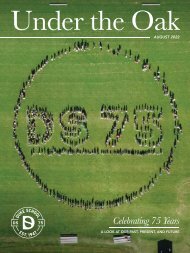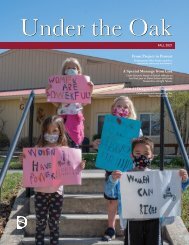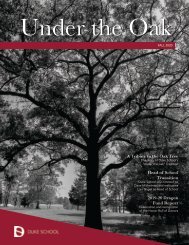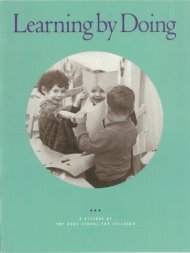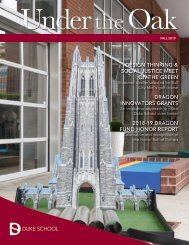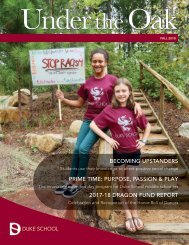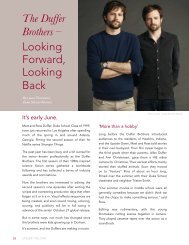Create successful ePaper yourself
Turn your PDF publications into a flip-book with our unique Google optimized e-Paper software.
<strong>Under</strong> <strong>the</strong> <strong>Oak</strong><br />
SUMMER <strong>2014</strong><br />
<strong>Duke</strong> <strong>School</strong> in <strong>the</strong> Community<br />
Excellence Through Service Learning and Outreach Projects<br />
Project Workshops for Educators<br />
Preparing Problem Solvers for <strong>the</strong> 21st Century<br />
Home-Court Advantage<br />
Athletic Enhancements on Campus<br />
UNDER THE OAK<br />
1
<strong>Under</strong> <strong>the</strong> <strong>Oak</strong><br />
INSIDE this issue<br />
DUKE SCHOOL CORE VALUES<br />
WHAT WE DO<br />
Inspire learners to boldly and creatively shape <strong>the</strong>ir future.<br />
MESSAGE FROM HEAD OF SCHOOL . . . . . . . . . . . . . . . . . . . . . . . . 4<br />
<strong>Duke</strong> <strong>School</strong> - a proud contributor in <strong>the</strong> community.<br />
IDEAS WE LIVE BY<br />
LEARNER-CENTERED<br />
Learners are <strong>the</strong> center of a dynamic and collaborative<br />
learning, inquiry and discovery process.<br />
ACTIVE INQUIRY<br />
Intellectual curiosity through project-based learning<br />
propels learners to explore multiple paths<br />
to creative solutions.<br />
BOLD THINKERS<br />
A deep love of learning and respect for our community<br />
forms bold, critical thinkers for life.<br />
WHY WE DO IT<br />
To prepare <strong>the</strong> next generation of problem solvers<br />
for our complex world.<br />
DUKE SCHOOL IN THE COMMUNITY . . . . . . . . . . . . . . . . . . . . . . . . 5<br />
Student service learning and outreach projects.<br />
FACULTY IN THE FIELD................................. 6<br />
Alumnus returns to <strong>Duke</strong> <strong>School</strong> as faculty member.<br />
COLLABORATIVE ARTS PROGRAM......................... 7<br />
Opening music and chorus programs to non-<strong>Duke</strong> <strong>School</strong> students.<br />
REFLECTIONS FROM JENNY MURRAY,<br />
NEW MIDDLE SCHOOL DIRECTOR . . . . . . . . . . . . . . . . . . . . . . . . 8<br />
Visiting <strong>Duke</strong> <strong>School</strong> as a candidate for a new position.<br />
PLOTTING ON COMMON GROUND . . . . . . . . . . . . . . . . . . . . . . . . 9<br />
Expanding <strong>Duke</strong> <strong>School</strong>’s community garden for families, faculty and staff.<br />
EDITORS<br />
WRITERS<br />
MAGAZINE DIRECTOR<br />
HEAD OF SCHOOL<br />
Tracy Proctor<br />
Irecka Smith<br />
Kathy Bartelmay<br />
Ann Davis<br />
Nicole Thompson<br />
Dave Michelman<br />
STAYING CONNECTED WITH MARILYN ORNSTEIN . . . . . . . . . . . . . . 10<br />
An educator and project expert’s ongoing services and outreach.<br />
PROJECT WORKSHOPS FOR EDUCATORS . . . . . . . . . . . . . . . . . . . 12<br />
Project Work: Preparing Problem Solvers for <strong>the</strong> 21st Century.<br />
HOME-COURT ADVANTAGE ............................. 14<br />
Athletic Enhancement Project adds new tennis courts on campus.<br />
DESIGNER<br />
PHOTOGRAPHER<br />
Gina Lorsson<br />
Molly Cronenwett<br />
<strong>Duke</strong> <strong>School</strong> publishes <strong>Under</strong> <strong>the</strong> <strong>Oak</strong> annually for its<br />
alumni, parents, grandparents and friends. If you would<br />
like to add someone to our mailing list, please e-mail<br />
communications@dukeschool.org. We also welcome news<br />
about alumni for future publications; please e-mail alumni@<br />
dukeschool.org with this information.<br />
ALUMNI CONNECTIONS: ALWAYS A DRAGON . . . . . . . . . . . . . . . . . 16<br />
Catching up with <strong>Duke</strong> <strong>School</strong> alumni and introducing new graduates.<br />
ON THE COVER:<br />
<strong>Oak</strong> tree on <strong>Duke</strong> <strong>School</strong>’s campus. Students and faculty<br />
use <strong>the</strong> oak tree as a regular meeting place and refer to it as<br />
U.T.O.T. (under <strong>the</strong> oak tree).<br />
2 UNDER THE OAK UNDER THE OAK<br />
3
Message from Dave Michelman, Head of <strong>School</strong><br />
Pat Bassett, <strong>the</strong> long-time President of NAIS<br />
(National Association of Independent <strong>School</strong>s),<br />
once remarked that if <strong>the</strong> only ones who would be<br />
upset by your school disappearing are current and<br />
past parents and students <strong>the</strong>n you are too insular.<br />
A great school is one that prepares its students<br />
well and is a vital contributor to <strong>the</strong> town in which it<br />
resides. <strong>Duke</strong> <strong>School</strong> is proud of <strong>the</strong> contributions<br />
it makes to Durham.<br />
Perhaps <strong>Duke</strong> <strong>School</strong>’s most obvious contribution<br />
to Durham is through <strong>the</strong> service outreach our<br />
first through eighth grade students participate<br />
in. Students support BackPack Buddies, read<br />
to reluctant beginning<br />
readers and feed lemurs.<br />
While students, naturally,<br />
take much from <strong>the</strong>se<br />
experiences, <strong>the</strong>y also help<br />
streng<strong>the</strong>n Durham.<br />
Students do more through<br />
projects. For <strong>the</strong> last several<br />
years, <strong>the</strong> seventh grade<br />
has adopted a park. The<br />
seventh graders work<br />
with Durham Parks and<br />
Recreation Department to<br />
identify a city park in need<br />
of improvements. The<br />
students survey neighbors,<br />
explore <strong>the</strong> park and<br />
investigate successful<br />
parks. They <strong>the</strong>n present a<br />
plan of improvement with a<br />
budget to representatives<br />
of Durham’s Park and<br />
Recreation department.<br />
The plan is debated by <strong>the</strong><br />
city and <strong>the</strong>n <strong>the</strong> approved<br />
parts are implemented. In<br />
<strong>the</strong> last few years, parks have gotten new water<br />
fountains, community gardens, bird houses,<br />
improved basketball courts, and slick new paint<br />
jobs because of our students.<br />
The fifth grade does a non-profit project where<br />
<strong>the</strong>y learn about how non-profits operate,<br />
including how <strong>the</strong>y market, fundraise and how <strong>the</strong>y<br />
live <strong>the</strong>ir mission. In <strong>the</strong> last few years, students<br />
have persuaded me to make <strong>Duke</strong> <strong>School</strong> <strong>the</strong><br />
training center for <strong>the</strong> dogs of BARKS, and three<br />
students were asked to present at a non-profit’s<br />
development event.<br />
Even eighth graders still support <strong>the</strong> community as<br />
part of <strong>the</strong>ir capstone individual project. Students<br />
have painted murals on older buildings, have<br />
decorated rooms at <strong>the</strong> Ronald McDonald House<br />
and have designed iPhone apps for pediatric<br />
cancer patients.<br />
Parents have also gotten into <strong>the</strong> act. At least three<br />
times a years, families come toge<strong>the</strong>r to help our<br />
community. They participate in <strong>the</strong> Big Sweep;<br />
<strong>the</strong>y help package 10,000 meals as part of Stop<br />
Hunger Now and collect books for Book Harvest,<br />
an organization started by a <strong>Duke</strong> <strong>School</strong> parent,<br />
which gives books to underprivileged children.<br />
The entire organization<br />
supports <strong>the</strong> Durham<br />
community. For <strong>the</strong> past<br />
two years, <strong>Duke</strong> <strong>School</strong><br />
has collaborated with o<strong>the</strong>r<br />
non-profit organizations<br />
in <strong>the</strong> Chapel Hill/Durham<br />
area to sponsor a weeklong<br />
adventure, The<br />
Collage Project. The<br />
summer program brings<br />
middle school students<br />
from diverse backgrounds<br />
toge<strong>the</strong>r for an expensefree<br />
collaborative arts<br />
experience.<br />
All of <strong>the</strong>se initiatives<br />
show <strong>Duke</strong> <strong>School</strong> as an<br />
important partner in <strong>the</strong><br />
Durham community. Even<br />
our unique approach<br />
to education provides<br />
educational alternatives<br />
to entrepreneurs,<br />
professionals, professors<br />
and doctors who are considering moving to <strong>the</strong><br />
area. <strong>Duke</strong> <strong>School</strong> has a real appeal to <strong>the</strong> creative<br />
class, which helps Durham continue its amazing<br />
renaissance as a wonderful place to live and work.<br />
As <strong>Duke</strong> <strong>School</strong> strives to create <strong>the</strong> next generation<br />
of problem solvers, a part of this mission is to<br />
model good citizenship through service learning<br />
– a curriculum designed to introduce students at<br />
a young age to stewardship and <strong>the</strong> importance<br />
of giving back to <strong>the</strong> community and creatively<br />
solving preexisting problems. I think we are doing<br />
a pretty good job.<br />
DUKE SCHOOL,<br />
IN THE C MMUNITY<br />
Fostering an environment where students are at<br />
<strong>the</strong> center of a dynamic and collaborative learning<br />
process goes beyond <strong>the</strong> classroom. <strong>Duke</strong> <strong>School</strong><br />
strives to lead by example—to be <strong>the</strong> epitome<br />
of excellence by instilling <strong>the</strong> principals of<br />
stewardship in its students at a young age through<br />
service learning. This is evident in activities from <strong>the</strong><br />
management of on-campus recycling to caring for<br />
an endangered species.<br />
Service learning, <strong>the</strong> ongoing commitment to<br />
community service and outreach, has always<br />
been a part of <strong>Duke</strong> <strong>School</strong>’s curriculum. While<br />
preschoolers and kindergarteners learn <strong>the</strong><br />
fundamentals of responsibility and assist <strong>the</strong>ir<br />
teachers with <strong>the</strong> upkeep of<br />
<strong>the</strong>ir classrooms, first through<br />
eighth graders collaborate with<br />
local organizations and create<br />
service projects unique to <strong>the</strong>ir<br />
grade. There are no required<br />
hours of service because <strong>Duke</strong><br />
<strong>School</strong> students want to work<br />
in <strong>the</strong>ir community. Students<br />
even create opportunities to be<br />
model citizens of <strong>the</strong> Triangle<br />
beyond <strong>the</strong>ir grade-level<br />
projects.<br />
This year, <strong>the</strong> Middle <strong>School</strong><br />
Student Council members<br />
created a giving tree and<br />
donated clo<strong>the</strong>s, shoes, toys and<br />
1,434 canned goods to Urban Ministries of Durham.<br />
Seventh graders have adopted city parks in Durham,<br />
partnering with Durham Parks and Recreation and<br />
<strong>Duke</strong> Forest to discuss ways in which <strong>the</strong>y can be<br />
of service and help make improvements to local<br />
parks. Students have also worked with children with<br />
autism and volunteered at Kids Cafe, where <strong>the</strong>y<br />
tutored, prepared meals for and planned STEM<br />
activities for children. Even <strong>Duke</strong> <strong>School</strong>’s parents,<br />
grandparents, faculty and staff help students make<br />
an impact in <strong>the</strong> community by raising more than<br />
$4,400 for Durham’s CROP Hunger Walk event and<br />
donating 2,520 books to Book Harvest.<br />
However, that’s only a snapshot of <strong>Duke</strong> <strong>School</strong>’s<br />
community efforts. For six years, <strong>Duke</strong> <strong>School</strong>’s first<br />
graders have partnered with BackPack Buddies,<br />
an organization that provides children from foodinsecure<br />
homes with weekend meals during<br />
<strong>the</strong> school year. A developmentally appropriate<br />
project, BackPack Buddies connects perfectly<br />
with <strong>the</strong> first grade healthy-selves curriculum and<br />
raises awareness about <strong>the</strong> need to help o<strong>the</strong>rs.<br />
Additionally, students are empowered by knowing<br />
that what <strong>the</strong>y do matters.<br />
“Children understand that <strong>the</strong>y are helping<br />
children of all ages,” says Carolynn Hageman, first<br />
grade teacher. “Service learning is really meaningful<br />
because it fits in with everything we do. Our hope is<br />
that <strong>the</strong>y will continue this work of helping o<strong>the</strong>rs.”<br />
As children transition from <strong>the</strong> Lower to Middle<br />
<strong>School</strong>, <strong>the</strong>ir service learning projects are just as<br />
important and <strong>the</strong>y naturally advance. Fifth graders<br />
are introduced to research through <strong>the</strong>ir work<br />
with <strong>the</strong> <strong>Duke</strong> Lemur Center service project—a<br />
partnership since 2008.<br />
“Students learn about <strong>the</strong> value<br />
of research and conservation,<br />
as well as all that goes into<br />
caring for <strong>the</strong> lemurs on a daily<br />
basis,” says Annie Genti<strong>the</strong>s,<br />
sixth grade teacher. “There<br />
are rich connections between<br />
our ongoing work at <strong>the</strong> Lemur<br />
Center and <strong>the</strong> fifth grade Zoo<br />
Project in <strong>the</strong> spring. Students<br />
realize how special it is to have<br />
a world-renowned research<br />
center right across <strong>the</strong> street<br />
from <strong>the</strong> school. ”<br />
Fifth graders visit <strong>the</strong> Lemur<br />
Center once a month to learn <strong>the</strong> trade of being<br />
a keeper by cleaning nesting boxes, creating and<br />
delivering enrichment, and preparing individualized<br />
diets for each lemur.<br />
“Everyone can be a steward for <strong>the</strong>ir community,”<br />
says teacher Angela Nelson. “All it takes is some<br />
research, a plan and follow through.”<br />
Following through is one of <strong>Duke</strong> <strong>School</strong>’s greatest<br />
contributions to <strong>the</strong> greater Durham community.<br />
Service learning and outreach projects provide<br />
students with valuable opportunities to use <strong>the</strong>ir<br />
research and planning skills to make an impact.<br />
Just look for <strong>the</strong> students who are wearing <strong>the</strong>ir<br />
maroon and grey t-shirts, eager to find and execute<br />
<strong>the</strong>ir creative solutions to local problems.<br />
4 UNDER THE OAK UNDER THE OAK 5
FACULTY<br />
IN THE FIELD<br />
with MICHAEL GILBERT<br />
grade teacher here at <strong>Duke</strong> <strong>School</strong> and now I<br />
was learning how to be a better teacher from<br />
her. Working with one of my former teachers on<br />
a professional level and reminiscing about when I<br />
was in third grade was wonderful. I now walk my<br />
students to art and PE with <strong>the</strong> very same teachers,<br />
Marki and Candy, that I had when I was at <strong>Duke</strong><br />
<strong>School</strong>. It is very cool.<br />
age, and I am happy that <strong>the</strong> kindergarten children<br />
will continue service learning at <strong>Duke</strong> <strong>School</strong>.<br />
Q: You have had several professional development<br />
and training opportunities, including working<br />
personally with Dr. Sylvia Chard. How did <strong>the</strong>se<br />
opportunities prepare you for your first school year<br />
as a <strong>Duke</strong> <strong>School</strong> teacher?<br />
A: The experiences I had in AmeriCorps greatly<br />
influenced my life. Building trails and working<br />
with <strong>the</strong> Red Cross for Hurricane Katrina relief<br />
were both humbling and exciting. I was able to<br />
make <strong>the</strong> outdoors accessible and provide help to<br />
people in Louisiana. Working with children was<br />
great too, although what really opened my mind<br />
and made me committed to becoming a teacher<br />
was teaching Spanish-speaking adults English at<br />
an elementary school in Colorado. O<strong>the</strong>r Corps<br />
members and I taught parents at <strong>the</strong> school<br />
while <strong>the</strong>ir children were<br />
in class. The adults were<br />
so kind, grateful and<br />
eager to learn, plus <strong>the</strong>y<br />
occasionally cooked us<br />
amazing food!<br />
Before becoming a teacher, you joined AmeriCorps<br />
and volunteered with <strong>the</strong> hurricane relief, built trails and<br />
taught young children. Can you talk about this experience<br />
and how it influenced you to become an educator?<br />
Q: As a <strong>Duke</strong> <strong>School</strong><br />
alumnus, having attended<br />
<strong>Duke</strong> <strong>School</strong> from kindergarten to eighth grade,<br />
how has project work and inquiry-based learning<br />
evolved since you were a student?<br />
A: In sixth grade at <strong>Duke</strong> <strong>School</strong> I had a teacher,<br />
Thomas Carson. For our science project we were<br />
interested in making a pond here at <strong>the</strong> Erwin<br />
Road campus. The class decided how big to make<br />
it and researched <strong>the</strong> plants and fish that would<br />
best survive in <strong>the</strong> climate we provided <strong>the</strong>m with.<br />
We called garden stores and researched how to<br />
make <strong>the</strong> pond. I think now, our faculty continues<br />
to follow student interest, guide children and<br />
“<strong>Duke</strong> <strong>School</strong> continues to<br />
have a wonderful, supportive<br />
community of learners. The<br />
teachers and parents all want<br />
what is best for <strong>the</strong> children.”<br />
facilitate meaningful learning in a very similar way.<br />
I just think <strong>the</strong> work continues to get deeper and<br />
<strong>the</strong> investigations more varied. I have noticed<br />
that <strong>the</strong> children are using even more reading,<br />
writing and math in project work than when I was<br />
a student here.<br />
Q: <strong>Duke</strong> <strong>School</strong>’s campus has changed a lot since<br />
you were a student on <strong>Duke</strong> <strong>School</strong>’s former Lower<br />
<strong>School</strong> campus on Hull Avenue, but what has<br />
remained <strong>the</strong> same?<br />
A: Last night I was sitting at<br />
graduation for <strong>the</strong> eighth<br />
graders and thinking<br />
about this same question.<br />
It seemed like our eighth<br />
graders were experiencing<br />
<strong>the</strong> same things I felt when<br />
attending <strong>Duke</strong> <strong>School</strong>.<br />
<strong>Duke</strong> <strong>School</strong> continues to have a wonderful,<br />
supportive community of learners. The teachers<br />
and parents all want what is best for <strong>the</strong> children.<br />
The children work toge<strong>the</strong>r and collaborate. The<br />
children are still funny and have fun toge<strong>the</strong>r.<br />
Q: After experiencing <strong>Duke</strong> <strong>School</strong> as a student<br />
and now a faculty member, do you feel like your<br />
connection to <strong>the</strong> school gives you an advantage?<br />
A: I think <strong>the</strong> connection does give me an<br />
advantage. I was fortunate last year to substitute<br />
teach in Kate and Kerry’s class. Kate was my third<br />
Q: <strong>Duke</strong> <strong>School</strong> incorporates service learning<br />
projects and community outreach activities into<br />
<strong>the</strong> curriculum at an early age. As a kindergarten<br />
teacher, how do you prepare your students for<br />
service learning?<br />
A: Service work is important to me. I did this in<br />
AmeriCorps and still do it today. This year our<br />
kindergarten class was able to help build <strong>the</strong> garden<br />
beds at <strong>the</strong> new and fantastic community garden.<br />
They brought shovels and wheel barrels and put<br />
<strong>the</strong> first dirt into <strong>the</strong> beds. I was surprised at how<br />
hard and how long <strong>the</strong>y worked. They insisted that<br />
<strong>the</strong>y would not stop until <strong>the</strong> job was done. This<br />
attitude is so important to instill in kids at an early<br />
Eight students from <strong>the</strong> Lerner<br />
<strong>School</strong>, Triangle Day <strong>School</strong> and<br />
members of <strong>the</strong> homeschool<br />
community performed<br />
alongside <strong>Duke</strong> <strong>School</strong>’s<br />
Middle <strong>School</strong> band and chorus<br />
students in this year’s winter and<br />
spring concert.<br />
A: I am very fortunate to have studied with Dr.<br />
Sylvia Chard. I love project work. Dr. Chard and<br />
former kindergarten teacher/consultant Marilyn<br />
Ornstein helped us at <strong>the</strong> beginning of this year<br />
when our class was studying pets. Our children<br />
started to make a list of questions <strong>the</strong>y wanted to<br />
investigate. These questions were honestly pretty<br />
low level, and Laurie Ann and I didn’t know what<br />
to do. Dr. Chard and Marilyn gave us great advice.<br />
When asking a question, <strong>the</strong> children should always<br />
pretend <strong>the</strong>y are talking to a real expert. Then <strong>the</strong><br />
questions will be more thoughtful and meaningful.<br />
Sure enough, this method worked. Our children<br />
continued to ask thoughtful questions throughout<br />
<strong>the</strong> year.<br />
COLLABORATIVEARTSPROGRAM<br />
These students travel to <strong>Duke</strong><br />
<strong>School</strong>’s campus twice weekly<br />
for combined rehearsals with<br />
<strong>Duke</strong> <strong>School</strong> students.<br />
“Opening <strong>the</strong> Middle <strong>School</strong><br />
music programs to students<br />
from schools without band<br />
and chorus programs and<br />
homeschool families with no<br />
access to band or chorus exposes<br />
families from o<strong>the</strong>r schools to<br />
<strong>Duke</strong> <strong>School</strong>’s campus, culture<br />
and community,” says Director<br />
of Auxiliary and Alternative<br />
Programs, Les Webster.<br />
“It also has <strong>the</strong> added benefit<br />
of giving <strong>Duke</strong> <strong>School</strong> students<br />
an opportunity to work with<br />
like-minded students from<br />
<strong>the</strong> surrounding independent<br />
school and homeschool<br />
community.”<br />
6 UNDER THE OAK UNDER THE OAK 7
Reflections from Jenny<br />
New Middle <strong>School</strong> Director<br />
Spring is <strong>the</strong> time for college visits for families<br />
across <strong>the</strong> country, mine included. My husband<br />
Craig and I had planned for this milestone since<br />
that proud day four years ago when we watched<br />
our son, Logan, graduate from eighth grade at<br />
<strong>Duke</strong> <strong>School</strong>. I still smile when I hear <strong>the</strong> Journey<br />
song he and his classmates chose to sing at <strong>the</strong><br />
graduation ceremony.<br />
Just as prospective college students make a<br />
campus visit, so do educators. What I didn’t know<br />
was that I would find myself looking at <strong>Duke</strong><br />
<strong>School</strong> through a different lens. I would be visiting<br />
a school I’ve loved as a parent and teacher for so<br />
many years, as a Middle <strong>School</strong> director candidate.<br />
Even though I was already quite familiar with <strong>Duke</strong><br />
<strong>School</strong> and its campus, my visit day brought with it<br />
new information and deepened my understanding<br />
not unlike <strong>the</strong> college visits Logan, Craig and I<br />
took across <strong>the</strong> state and up <strong>the</strong> east coast.<br />
My visit and interview day started with an overview<br />
information session with <strong>the</strong> Head of <strong>School</strong>,<br />
Dave Michelman, who asked me questions and<br />
answered my queries to confirm that we are a<br />
good match. I <strong>the</strong>n<br />
moved on to<br />
“...What I didn’t know was<br />
that I would find myself looking at <strong>Duke</strong><br />
<strong>School</strong> through a different lens....<br />
I would be visiting a school I’ve loved as a parent<br />
and teacher for so many years, as a Middle <strong>School</strong><br />
director candidate. What I found was a renewed<br />
passion and conviction that <strong>Duke</strong> <strong>School</strong> is<br />
a special place and <strong>the</strong> right one<br />
for me.”<br />
meetings with various constituencies— teachers,<br />
students and parents—each with <strong>the</strong>ir own<br />
questions and important information, not unlike<br />
<strong>the</strong> academic department sessions at most<br />
colleges. I even met with <strong>the</strong> people who control<br />
<strong>the</strong> finances and make it possible for us to do <strong>the</strong><br />
great work that we do. In each session, I answered<br />
and asked questions so that we could all feel<br />
comfortable with <strong>the</strong> decision ahead.<br />
What I found was a renewed passion and conviction<br />
that <strong>Duke</strong> <strong>School</strong> is a special place and <strong>the</strong> right<br />
one for me. Educators, administrators, students<br />
and parents here are dedicated, talented people<br />
who want <strong>the</strong> very best for children educationally,<br />
socially and emotionally. Teachers care deeply<br />
about <strong>the</strong> program <strong>the</strong>y deliver for children each<br />
and every day. Parents want to understand and be<br />
involved in <strong>the</strong>ir children’s school. Students want<br />
to learn, explore and grow. Administrators want<br />
to lead in creating an environment that allows all<br />
parties to work toge<strong>the</strong>r to achieve <strong>the</strong> established<br />
goals and beyond.<br />
I am honored to be <strong>the</strong> next Middle <strong>School</strong><br />
director, and I look forward to working in this new<br />
capacity with such a diverse and involved group<br />
of people. Working toge<strong>the</strong>r, I foresee an even<br />
brighter future for our beloved Middle <strong>School</strong>.<br />
Alas, college visits have ended, and my son has<br />
chosen his next educational home. As he continues<br />
to build on <strong>the</strong> strong foundation from his years<br />
at <strong>Duke</strong> <strong>School</strong>, I feel confident that he too has<br />
chosen well.<br />
Logan’s next “educational home” along with<br />
his fellow <strong>Duke</strong> <strong>School</strong> classmates can be<br />
found on page 18.<br />
PLOTTING<br />
ON COMMON GROUND<br />
The votes are in,<br />
and so it is that <strong>Duke</strong> <strong>School</strong> is <strong>the</strong> home of a<br />
community garden – a place for families to grow<br />
produce and flowers for <strong>the</strong>ir personal use.<br />
Nestled next to <strong>the</strong> Middle <strong>School</strong> Gym, <strong>the</strong><br />
community garden contributes to a more<br />
sustainable environment, promotes a positive<br />
community image and creates opportunities for<br />
friends and neighbors to work toge<strong>the</strong>r.<br />
Last year, members of <strong>the</strong> Parent Service<br />
Organization (PSO) Garden Committee borrowed<br />
space from <strong>the</strong> Preschool to begin a small garden.<br />
The garden was a hit, and after its harvest was<br />
served at a <strong>Duke</strong> <strong>School</strong> community dinner, <strong>the</strong>re<br />
was a high demand for<br />
more space to grow fresh<br />
fruits and vegetables.<br />
Fast-forward a year, and<br />
now <strong>the</strong>re’s a beautiful<br />
area, hosting 18 plots,<br />
all of which are in use.<br />
Several classes have also<br />
taken <strong>the</strong> community<br />
garden under <strong>the</strong>ir wings<br />
to care for and complete<br />
project work activities.<br />
Even <strong>the</strong> creation of <strong>the</strong><br />
community garden was<br />
fertile soil for project<br />
work. Fifth graders measured <strong>the</strong> perimeter of <strong>the</strong><br />
fence, and <strong>the</strong> area and volume of <strong>the</strong> plots to help<br />
<strong>the</strong> school determine estimates for <strong>the</strong> garden’s<br />
fence and soil. Kindergarteners used tiny shovels<br />
and wheelbarrows to move soil, while one class<br />
even rented a plot for project work. Some fourth<br />
graders planted sweet potatoes, corn beans and<br />
squash to represent <strong>the</strong>ir North Carolina project.<br />
Perhaps <strong>the</strong> greatest benefit of <strong>the</strong> community<br />
garden, besides <strong>the</strong> fact that people are growing<br />
<strong>the</strong>ir own foods, is <strong>the</strong> way in which it naturally<br />
builds <strong>the</strong> school community. Families are working<br />
toge<strong>the</strong>r, sharing advice and even helping each<br />
o<strong>the</strong>r water plots.<br />
“It is a true community feel,” says Student Support<br />
Specialist Tiffane Land, who observed three<br />
generations working in <strong>the</strong> garden toge<strong>the</strong>r. “We<br />
are connecting with families within our community<br />
that we would not normally come across because<br />
our kids are in different grades.”<br />
Tiffane says <strong>the</strong>re is available space for <strong>the</strong><br />
community garden’s expansion in <strong>the</strong> future.<br />
Future garden plans also include a fence display of<br />
student murals, planting of berry bushes and fruit<br />
trees as well as workshops and events that will be<br />
open to <strong>the</strong> entire <strong>Duke</strong> <strong>School</strong> community.<br />
8 UNDER THE OAK<br />
UNDER THE OAK 9
STAYING<br />
CONNECTED<br />
lower east side of Manhattan for two years before<br />
moving to Wisconsin for her husband’s doctoral<br />
studies. She taught third grade in Wisconsin,<br />
<strong>the</strong>n preschool in Princeton, New Jersey, before<br />
settling in <strong>the</strong> Durham/Chapel Hill area in <strong>the</strong> early<br />
1970s and teaching two- and three-year-olds.<br />
public schools will use this tool when planning<br />
<strong>the</strong>ir goals and curricula. While participating in<br />
this think tank, Marilyn had <strong>the</strong> chance to work<br />
with a special new collaborator - her husband.<br />
Peter is a developmental psychologist at <strong>the</strong><br />
University of North Carolina at Chapel Hill, and,<br />
studied <strong>the</strong> history of jazz and ballet, Haiti, Ernest<br />
Hemingway and F. Scott Fitzgerald and o<strong>the</strong>r<br />
literary expatriates in Paris, and <strong>the</strong> Trojan War<br />
through <strong>the</strong> works of Euripides.<br />
Marilyn has passed her love of learning and<br />
Marilyn’s expertise with <strong>Duke</strong> <strong>School</strong>’s projectbased<br />
curriculum began when Margaret Mason,<br />
<strong>the</strong>n curriculum director, sent her to a workshop<br />
with Drs.Lilian Katz and Sylvia Chard – <strong>the</strong> creators<br />
of <strong>the</strong> Project Approach. Margaret realized <strong>the</strong><br />
benefit of this particular type of learning and<br />
chose Marilyn to ga<strong>the</strong>r <strong>the</strong> first information on<br />
it because of her extensive background in early<br />
childhood education.<br />
somewhat surprisingly, this is <strong>the</strong> first time <strong>the</strong>ir<br />
related careers have ever directly crossed paths.<br />
Outside of formal education settings, Marilyn’s<br />
hobbies include teaching, as well. This fact isn’t<br />
that surprising as she says, “teaching is in me from<br />
<strong>the</strong> top of my head to <strong>the</strong> bottom of my toes!”<br />
Through a UNC partnership program, she has<br />
been working with a Burmese family teaching<br />
both a six-year-old student and his fa<strong>the</strong>r.<br />
teaching on not just to her students and fellow<br />
teachers but to her family, as well. One of her<br />
daughters is a clinical psychologist at <strong>the</strong> ADHD<br />
Clinic at <strong>Duke</strong> University, working with families on<br />
how <strong>the</strong>ir children can become successful learners.<br />
Her o<strong>the</strong>r daughter is a preschool teacher at<br />
<strong>Duke</strong> <strong>School</strong>. Miriam Ornstein and her co-teacher<br />
Maureen were actually <strong>the</strong> first pair of <strong>Duke</strong><br />
<strong>School</strong> teachers with whom Marilyn consulted on<br />
<strong>the</strong> Project Approach after her retirement.<br />
with Marilyn Ornstein<br />
Few people have a history with <strong>Duke</strong> <strong>School</strong> like<br />
Marilyn Ornstein. Marilyn began her tenure at<br />
<strong>Duke</strong> <strong>School</strong> in 1982 in <strong>the</strong> midst of an already<br />
well-established early childhood education career.<br />
Since retiring in 2011, Marilyn has continued to<br />
share her wealth of knowledge at <strong>the</strong> school<br />
partially as a substitute teacher but more often<br />
as a consultant, working with teacher pairs on<br />
<strong>the</strong>ir training in <strong>the</strong> Project Approach, <strong>the</strong> specific<br />
project-based style of learning in which <strong>the</strong> school<br />
has become a leader.<br />
A New York City native, Marilyn went to school at<br />
Queens College and taught second grade on <strong>the</strong><br />
As <strong>Duke</strong> <strong>School</strong> integrated <strong>the</strong> Project Approach,<br />
Marilyn’s expertise became sought after throughout<br />
<strong>the</strong> North Carolina education community, not just<br />
by private schools but by <strong>the</strong> public sector as well.<br />
The Randolph County Partnership for Children<br />
not only sends representatives to <strong>Duke</strong> <strong>School</strong>hosted<br />
educator workshops, but has requested<br />
that Marilyn travel to <strong>the</strong>m multiple times over <strong>the</strong><br />
past few years for extra education on <strong>the</strong> Project<br />
Approach.<br />
Marilyn has also been part of a number of books<br />
and pamphlets on early education published by<br />
<strong>the</strong> NC Department of Public Instruction including<br />
“<strong>the</strong> North Carolina Guide for <strong>the</strong> Early Years” and<br />
“Learning Through <strong>the</strong> Eyes of a Child: A Guide to<br />
Best Teaching Practices in Early Education.”<br />
Recently, Marilyn was part of a think tank<br />
sponsored by <strong>Duke</strong> University’s Sanford <strong>School</strong> of<br />
Public Policy and <strong>the</strong> North Carolina Department<br />
of Public Instruction. This group created a<br />
learning and development assessment tool for<br />
kindergarten through third grade. It is hoped that<br />
Marilyn also currently volunteers with <strong>the</strong> Durham Head of <strong>School</strong> Dave Michelman calls Marilyn an<br />
Literacy Council, where she tutors a woman from institution and a treasure. “Her knowledge of<br />
<strong>the</strong> Republic of Guinea who had no education in<br />
her first language, let alone English. After working<br />
for years with young children who come from<br />
a literate background, here was a student who<br />
didn’t even know how to hold a pencil. It required<br />
a different way to approach teaching her to read.<br />
project development and <strong>the</strong> extensive work she<br />
has done with new teachers is invaluable,” he says.<br />
Not content to be a subject expert, her sharing<br />
of knowledge with current teachers will benefit<br />
children for years to come, not just at <strong>Duke</strong> <strong>School</strong><br />
but all over North Carolina.<br />
After about three years of<br />
working toge<strong>the</strong>r, this woman<br />
recently passed her citizenship<br />
test, and Marilyn was <strong>the</strong>re to<br />
see her sworn in as an American<br />
citizen.<br />
When not fur<strong>the</strong>ring <strong>the</strong><br />
education of o<strong>the</strong>rs, Marilyn<br />
embodies <strong>Duke</strong> <strong>School</strong>’s<br />
mission of lifelong learning<br />
in her personal life. She is a<br />
regular student of <strong>the</strong> Osher<br />
Lifelong Learning Institute<br />
(OLLI) at <strong>Duke</strong> University. In<br />
<strong>the</strong> past few years she has<br />
Marilyn attending her student’s Naturalization Ceremony.<br />
10 UNDER THE OAK UNDER THE OAK 11
PROJECT<br />
WORKSHOP FOR<br />
EDUCATORS<br />
Project-based learning is definitely in <strong>the</strong> limelight<br />
<strong>the</strong>se days. <strong>School</strong>s across <strong>the</strong> country, striving to<br />
prepare students for <strong>the</strong> 21st century, are seeking<br />
ways to engage its students in strategic inquiry<br />
work and problem solving. At <strong>Duke</strong> <strong>School</strong>, on<br />
<strong>the</strong> o<strong>the</strong>r hand, inquiry-based project work has<br />
been fundamental since its inception. As Lower<br />
<strong>School</strong> Director Sandy Gillespie says, “The Project<br />
Approach is designed to get children interested<br />
in learning and to take ownership of <strong>the</strong>ir own<br />
education,” a value now considered as best<br />
practice across <strong>the</strong> country.<br />
When <strong>the</strong> school began getting more requests for<br />
educator tours and project training than it could<br />
handle, Les Webster, <strong>Duke</strong> <strong>School</strong>’s director of<br />
auxiliary and alternative programs, and directors<br />
Kathy Bartelmay, Sandy Gillespie and Jenny<br />
Murray, saw this as an unique opportunity. A<br />
<strong>Summer</strong> Institute for Educators, Project Work:<br />
Preparing Problem Solvers for <strong>the</strong> 21st Century,<br />
was launched in 2013. The workshop quickly filled<br />
with educators from across <strong>the</strong> country, eager to<br />
learn how to implement inquiry-based projects in<br />
<strong>the</strong>ir own schools.<br />
The first seeds for <strong>the</strong> project workshops were<br />
sown in 1996 when Drs. Lilian Katz and Sylvia<br />
Chard, creators of <strong>the</strong> Project Approach, visited<br />
<strong>Duke</strong> <strong>School</strong> and conducted a four-day workshop<br />
for <strong>the</strong> entire faculty. The goal was to deepen every<br />
faculty member’s understanding of project work<br />
and to build a cohesive preschool through eighth<br />
grade program. The school has had an ongoing<br />
relationship with Drs. Katz and Chard ever since,<br />
sending new teachers to <strong>the</strong>ir <strong>Summer</strong> Institute at<br />
<strong>the</strong> University of Illinois and inviting Dr. Chard to<br />
consult on a regular basis.<br />
But most importantly, faculty members continue<br />
<strong>the</strong> work and have conversations day in and day out<br />
about planning projects collaboratively, observing<br />
one ano<strong>the</strong>r’s classroom and sharing samples of<br />
student work.<br />
“The conversations and shared student work has<br />
made a huge difference to student success and my<br />
journey as a learner,” says Julie Marshall, second<br />
grade teacher and project committee member.<br />
As a result of this ongoing work, <strong>Duke</strong> <strong>School</strong><br />
teachers have become leaders in inquiry-based<br />
project work. Their work has been featured in<br />
several publications by Drs. Katz and Chard and on<br />
<strong>the</strong> Project Approach Web site. In addition, Kathy<br />
and Sandy are members of <strong>the</strong> Project Approach<br />
Teacher Education Network (PATEN), a small team<br />
of Project Approach consultants.<br />
Lower <strong>School</strong> art teachers Marki and Jodi with<br />
kindergarten students.<br />
But learning about <strong>the</strong> Project Approach at a<br />
conference is not as powerful as seeing it in action.<br />
When Kathy received a request to train teachers at<br />
<strong>the</strong> Episcopal <strong>School</strong> of Baton Rouge a few years<br />
Sixth grade teacher Michelle Reich with student Lauren Taylor.<br />
ago, she invited <strong>the</strong>m to visit <strong>Duke</strong> <strong>School</strong> instead. Institute for educators each year. The next <strong>Summer</strong><br />
In addition to observing students deeply engaged Institute will be this August.<br />
in <strong>the</strong>ir investigations, educators were able to ask<br />
<strong>Duke</strong> <strong>School</strong> teachers logistical questions that “This has really changed my thinking about project<br />
were essential for successful implementation of work and how to do it. It’s been wonderful to<br />
inquiry-based curriculum.<br />
see kids so engaged and be such great problem<br />
solvers,” one participant wrote in her workshop<br />
“It’s one of my favorite things, to teach teachers,” evaluation.<br />
says Jenny. “We can help more children that way.<br />
It’s exciting to know that what we know about Just as <strong>Duke</strong> <strong>School</strong> teaches its students to be<br />
teaching children best will go to o<strong>the</strong>r schools.” productive members of <strong>the</strong>ir community, <strong>the</strong> school<br />
itself is a great example to o<strong>the</strong>r independent and<br />
<strong>Duke</strong> <strong>School</strong> now hosts a Winter and <strong>Summer</strong> public schools.<br />
12 UNDER THE OAK UNDER THE OAK 13
HOME-COURT<br />
ADVANTAGE<br />
<strong>Duke</strong> <strong>School</strong> has evolved quite a bit since its<br />
creation in 1947, most recently and visibly with<br />
<strong>the</strong> relocation of <strong>the</strong> Lower <strong>School</strong> to create<br />
one cohesive campus. Now, a new athletic<br />
enhancement project is underway—<strong>the</strong> creation<br />
of new tennis courts.<br />
It has long been planned to add tennis courts to<br />
<strong>Duke</strong> <strong>School</strong>’s campus as, until now, <strong>the</strong> boys’<br />
and girls’ tennis teams are <strong>the</strong> only school athletic<br />
teams that do<br />
not practice and<br />
compete onsite.<br />
Currently, <strong>the</strong><br />
tennis teams<br />
use <strong>the</strong> courts at<br />
Morreene Road<br />
Park, just a few<br />
minutes away.<br />
Athletic Director<br />
and Middle <strong>School</strong> Physical Education Teacher<br />
Jean Sartain said <strong>the</strong> Morreene Road courts are<br />
“as good as it can be if you don’t have your own<br />
courts,” but <strong>the</strong>re are many benefits to having <strong>the</strong><br />
courts on campus.<br />
The first benefit is that by having courts onsite<br />
<strong>Duke</strong> <strong>School</strong> can be responsible for <strong>the</strong>ir upkeep<br />
and keep <strong>the</strong>m in tiptop condition, instead of<br />
having to deal with public courts that may be low<br />
on <strong>the</strong> county’s maintenance priority list. Jean<br />
says she believes some students are discouraged<br />
from enjoying tennis because <strong>the</strong> city courts are<br />
showing wear and tear, and <strong>the</strong>y are very excited<br />
to have really good courts on which to play.<br />
One great advantage to<br />
having home courts is that<br />
more people will come to watch<br />
<strong>the</strong> tennis teams compete.<br />
Tennis matches will be more efficient when held<br />
on campus. Students will no longer have to waste<br />
practice time being bussed to <strong>the</strong> public courts.<br />
While only a few minutes away, those wasted<br />
minutes add up over a season. Also, <strong>the</strong>re are only<br />
five courts at Morreene Road, and <strong>the</strong>re will be six<br />
at <strong>Duke</strong> <strong>School</strong>. This means that one more set of<br />
opponents can be competing at <strong>the</strong> same time,<br />
and everyone can have <strong>the</strong>ir turn sooner.<br />
One great advantage to having home courts is that<br />
more people will come to watch <strong>the</strong> tennis teams<br />
compete. Right now, <strong>the</strong> spectators are mainly<br />
parents. By having matches directly on campus,<br />
more students will<br />
be able to stay<br />
to cheer on <strong>the</strong>ir<br />
classmates while<br />
<strong>the</strong>y compete.<br />
Head of <strong>School</strong><br />
Dave Michelman<br />
says it will be a<br />
great benefit for<br />
<strong>Duke</strong> <strong>School</strong>’s<br />
tennis teams to feel more a part of <strong>the</strong> school’s<br />
athletic community.<br />
In addition, ei<strong>the</strong>r by having more exposure to <strong>the</strong><br />
school matches or just from being tempted by <strong>the</strong><br />
shiny new courts, Jean says that it is likely more<br />
students will want to join <strong>the</strong> teams. This spring,<br />
nine boys are on <strong>the</strong> tennis team, and fourteen<br />
girls competed for <strong>Duke</strong> <strong>School</strong> this past fall.<br />
Plus, having onsite courts means that <strong>the</strong>y will be<br />
available to <strong>the</strong> <strong>Duke</strong> <strong>School</strong> community and add<br />
to <strong>the</strong> school’s summer camp programs.<br />
Having tennis courts on campus also means that<br />
tennis can now be taught as part of <strong>the</strong> physical<br />
education curriculum. “Tennis is a lifelong sport,<br />
so it would be a great addition to <strong>the</strong> PE program,”<br />
says Dave.<br />
For all <strong>the</strong>se reasons, “we are so pleased that <strong>the</strong><br />
tennis courts have come about,” says Jean. “Not<br />
many schools that only go through grade eight<br />
have <strong>the</strong>ir own tennis courts. We are very, very<br />
lucky.”<br />
Dave says because of <strong>the</strong> school’s solid financial<br />
status, it was able to allocate a portion of its<br />
bond funds (which are designated for capital<br />
improvements) to <strong>the</strong> Athletic Enhancement<br />
Project. This source of funding in conjunction<br />
with <strong>the</strong> restricted gifts received from several<br />
private donors helped fund <strong>the</strong> project in totality<br />
and avoided a major campaign. The Athletic<br />
Enhancement Project is a valuable addition<br />
to <strong>Duke</strong> <strong>School</strong> and will provide considerable<br />
enhancements for students, parents and alumni.<br />
“Thanks to <strong>the</strong> support of generous donors, <strong>Duke</strong><br />
<strong>School</strong> students will be able to begin playing on<br />
<strong>the</strong>ir own tennis courts next academic year,” says<br />
Kenneth W. Chandler, <strong>Duke</strong> <strong>School</strong>’s director of<br />
development. “Plans for enhancing our soccer<br />
fields are still under review, and we are continuing<br />
to evaluate <strong>the</strong> best ways to enhance <strong>the</strong> current<br />
field and plan for appropriate irrigation. These gifts<br />
have helped to streng<strong>the</strong>n our athletic program<br />
and enrich <strong>the</strong> student-athlete experience. ”<br />
14 UNDER THE OAK<br />
UNDER THE OAK<br />
15 15
Alumni Connections: Always a Dragon<br />
had a baby girl, Hadley Michelle! Iris says her life<br />
Annelle Sheline went to New York University’s<br />
MINI-PROFILES<br />
CLASS OF 2000<br />
Meet Julia Fiore<br />
Julia attended <strong>Duke</strong><br />
<strong>School</strong> from preschool<br />
through eighth grade<br />
and <strong>the</strong>n went to<br />
Durham <strong>School</strong> of <strong>the</strong><br />
Arts. While at Vassar<br />
College, she majored in<br />
environmental studies<br />
and spent summers<br />
in Durham working at summer camps. After<br />
graduating, Julia spent a few years teaching on an<br />
educational farm in California, and since 2011, she<br />
has been <strong>the</strong> program director at Camp Riverlea,<br />
a day camp in Durham County. She also worked<br />
at two farms in Durham County, including Little<br />
Sprout Farm, where she helped grow veggies and<br />
<strong>the</strong> Prodigal Farm, where she worked with goats<br />
and learned <strong>the</strong> trade of cheese making.<br />
<strong>School</strong> students and teachers, and is continuing to<br />
grow. Julia looks forward to organizing exciting<br />
community events and expanding <strong>the</strong> alumni<br />
network in <strong>the</strong> year ahead.<br />
Julia started connecting with her fellow Class of<br />
2000 alums first and learned that <strong>the</strong>y have had<br />
varied and successful experiences since leaving<br />
<strong>Duke</strong> <strong>School</strong>.<br />
Kate Chavez (Hotelling) started working for<br />
a local non-profit that provides resources to<br />
developmentally disabled adults after she<br />
graduated from <strong>the</strong> University of New Mexico. Her<br />
work inspired her to pursue <strong>the</strong> behavioral health<br />
field, and she is currently at New Mexico Highlands<br />
University in <strong>the</strong> second semester of her masters<br />
in clinical social work. Kate is also a newlywed,<br />
marrying in June of 2013. She currently lives in<br />
Albuquerque, New Mexico, where she works with<br />
high-risk kids at a seventh through twelfth grade<br />
charter school.<br />
is super busy working full time, being a mom and<br />
wife and attending school part time but “totally<br />
worth it.”<br />
Emma Schall graduated from Loyola University in<br />
New Orleans, where she studied graphic design.<br />
After graduating, she began working for Line 58,<br />
a branding and web design firm. Emma has lived<br />
in New Orleans for 10 years and says it has been<br />
an adventure. Traveling has been a big part of her<br />
family’s life as <strong>the</strong>y have visited Ecuador, Chile and<br />
Quebec. She is recently engaged and planning a<br />
wedding for next spring.<br />
(NYU) Gallatin <strong>School</strong> of Individualized Study, <strong>the</strong>n<br />
worked as a journalist in Egypt and Yemen for a<br />
few years before returning to <strong>the</strong> United States<br />
to complete a Ph.D. in political science at The<br />
George Washington University in D.C. Annelle’s<br />
research is on <strong>the</strong> Middle East, and she will be in<br />
<strong>the</strong> Persian Gulf and <strong>the</strong> Levant next year doing<br />
fieldwork for her dissertation. Annelle says <strong>Duke</strong><br />
<strong>School</strong>’s former teacher Jane Ann McCullough<br />
remains <strong>the</strong> best teacher she ever had!<br />
Elyssa Weber is currently enrolled in a clinical<br />
psychology doctoral program at <strong>the</strong> University of<br />
Massachusetts, Boston, where she researches <strong>the</strong><br />
effects of natural disasters. As part of her program,<br />
Elyssa is also conducting clinical work<br />
in neuropsychology at a Boston area<br />
hospital. She previously worked at<br />
<strong>the</strong> University of Maryland, Baltimore,<br />
conducting psychiatric research after<br />
graduating from Wellesley College. In<br />
her free time she enjoy arts and crafts<br />
and catching up with her old friends from<br />
<strong>Duke</strong> <strong>School</strong>.<br />
With many happy memories from being a<br />
student at <strong>Duke</strong> <strong>School</strong>, Julia was delighted to<br />
join <strong>the</strong> Development Office as <strong>the</strong> events and<br />
Parent Service Organization (PSO) coordinator in<br />
December 2013. She has enjoyed helping <strong>the</strong> PSO<br />
organize events and re-connecting with <strong>the</strong> school<br />
and with her former teachers.<br />
Tory Clark received her undergraduate degree<br />
from Tufts University and has stayed in <strong>the</strong><br />
Cambridge/Boston area. She spent about five<br />
years “gallivanting about <strong>the</strong> globe,” teaching<br />
countries about climate change and energy<br />
software. She is now in her second semester of an<br />
energy policy masters program at Massachusetts<br />
Institute of Technology (MIT).<br />
“The Bench” built by <strong>the</strong> Class of 2000 and repainted many times since <strong>the</strong>n.<br />
We will feature a class notes section in<br />
future publications. Please send notes to<br />
Julia at alumni@dukeschool.org.<br />
As an alumna, she was <strong>the</strong> perfect person to lead<br />
<strong>Duke</strong> <strong>School</strong>’s alumni network. Since Julia began<br />
working at <strong>Duke</strong> <strong>School</strong>, she has created a <strong>Duke</strong><br />
<strong>School</strong> Alumni Facebook Group. The group has<br />
more than 140 members, consisting of former <strong>Duke</strong><br />
Iris Jackola (Warszawski) received her nursing<br />
degree from <strong>Duke</strong> University and is now returning<br />
to school to become a family nurse practitioner. In<br />
May 2011, she got married and this past October,<br />
If you graduated (completed eighth grade)<br />
or ever attended <strong>Duke</strong> <strong>School</strong>, you are an<br />
alumnus/alumna.<br />
16 UNDER THE OAK UNDER THE OAK 17
Alumni Connections: Destinations of 2010 Grads<br />
Join our <strong>Duke</strong> <strong>School</strong> Alumni Facebook Group –<br />
a forum for reconnecting with old classmates while<br />
keeping in touch with <strong>Duke</strong> <strong>School</strong>.<br />
Marisela Aguirre<br />
Alisha Anaya<br />
Alice Broderick<br />
Isaiah Bryant<br />
Corey Coleman<br />
Avery Dart<br />
Alaina DeLisle<br />
Sean Freemerman<br />
Alexandra Garcia<br />
Drew Gotwals<br />
Brandon Hawkins<br />
Charles Herst<br />
Rachel Hill<br />
Ryan Jackson<br />
Justin Katz<br />
Eleanor Kunz<br />
Emily Lane<br />
Naomi Lerner<br />
Erik Lutz<br />
Lia Manos<br />
Zac Marion<br />
Nathaniel Merrill<br />
Thomas Moorhead<br />
Collins Mullen<br />
Grant Murphy-Herndon<br />
Logan Murray<br />
Rex Musette-Blumenthal<br />
Tara Nagar<br />
Camille Oliverio<br />
Emma Postel<br />
Malcolm Price<br />
Kaitlyn Reed<br />
Will Ruff<br />
Eve Ruff<br />
Jawaun Short<br />
Maya Sugg<br />
Alex Teunis<br />
Nathan VanLandingham<br />
Emma Westlund<br />
Abby Westlund<br />
Annie Wieland<br />
Colin Wilkins<br />
Odom Williford<br />
Lucy Wooldridge<br />
Julian Young<br />
East Carolina University<br />
George Washington University<br />
Virginia Commonwealth University<br />
Brown University<br />
Nor<strong>the</strong>astern University<br />
UNC - Wilmington<br />
East Carolina University<br />
UNC - Chapel Hill<br />
*<br />
Appalachian State University<br />
Wake Forest University<br />
Appalachian State University<br />
Yale University<br />
UNC - Chapel Hill<br />
Yale University<br />
North Carolina State University<br />
Harvey Mudd College<br />
UNC - Chapel Hill<br />
North Carolina State University<br />
UNC - Chapel Hill<br />
<strong>Duke</strong> University<br />
Macalester College - St. Paul, MN<br />
UNC - Greensboro<br />
UNC - Chapel Hill<br />
Northwestern University<br />
North Carolina State University - College of Design<br />
UNC - Asheville<br />
<strong>Duke</strong> University<br />
Virginia Commonwealth University <strong>School</strong> of <strong>the</strong> Arts<br />
Wellesley College<br />
Guilford College<br />
Appalachian State University<br />
Columbia University<br />
Nor<strong>the</strong>astern University<br />
North Carolina A&T University<br />
UNC - Asheville<br />
Emory College<br />
Emory & Henry College<br />
Denison University<br />
Furman University<br />
Nor<strong>the</strong>astern University<br />
American Field Service International Exchange Program - Norway<br />
UNC - Asheville<br />
<strong>Duke</strong> University<br />
Elon University<br />
CLASS HIGHLIGHTS<br />
RACHEL HILL<br />
Valedictorian at Jordan High <strong>School</strong><br />
JUSTIN KATZ<br />
Valedictorian at Durham Academy<br />
ZAC MARION<br />
Valedictorian at Cedar Ridge High <strong>School</strong><br />
* Plans not yet known/confirmed<br />
HIGH SCHOOL DESTINATIONS<br />
OF <strong>2014</strong> GRADS<br />
Carolina Friends <strong>School</strong>:<br />
Megan Aurentz<br />
Violet Bishop<br />
Gwyneth Graham<br />
Jackson Kennedy<br />
Adina Ornstein-Luks<br />
Ben Westlund<br />
Cedar Ridge High <strong>School</strong>:<br />
Grace McGhee<br />
Kate Milner<br />
Sol Rosenbluth<br />
William Stiffler<br />
Chapel Hill High <strong>School</strong>:<br />
Olivia Garcia<br />
Durham Academy:<br />
Jaspreet Bhutani<br />
Gwen Caudle<br />
Ca<strong>the</strong>rine Horrigan<br />
Charles Hua<br />
Jake Jeffries<br />
Ava Pacchiana<br />
Sterling Roberts<br />
Durham <strong>School</strong> of <strong>the</strong> Arts:<br />
Juliana Manson<br />
East Chapel Hill High <strong>School</strong>:<br />
Noah Clapacs<br />
Molly Horan<br />
Eli Schulman<br />
Jordan High <strong>School</strong>:<br />
Emily Coin<br />
Estelle Hamilton<br />
Julian Morrison<br />
Andrew Taylor<br />
Ingrid Trost<br />
Maya Saterson<br />
Trent Smith<br />
Riverside High <strong>School</strong>:<br />
Ryan Greenblatt<br />
Connor Van Deman<br />
Carrboro High <strong>School</strong>:<br />
Chloe Turner<br />
Cardinal Gibbons High <strong>School</strong>:<br />
Eric Horlbeck<br />
Sam Marcom<br />
Joey Uzarski<br />
Northwood High <strong>School</strong>:<br />
Bridget O’Donnell<br />
Pan<strong>the</strong>r Creek High <strong>School</strong>:<br />
Alex Cole<br />
Morgan Gustafson<br />
Public <strong>School</strong> in California:<br />
Kalina Aragon<br />
Undecided:<br />
Anna Marshall<br />
Sean Williams<br />
Bella Xavier<br />
CONGRATULATIONS<br />
TO THE CLASS OF <strong>2014</strong>!<br />
WE WILL MISS YOU!<br />
18 UNDER THE OAK UNDER THE OAK 19
<strong>Duke</strong> <strong>School</strong> launched its new<br />
school logo, marketing campaign<br />
and named <strong>the</strong> <strong>Duke</strong> <strong>School</strong><br />
dragon mascot, Sparky in 2011-12.<br />
<strong>Duke</strong> <strong>School</strong>’s logo expresses an<br />
energy and balance (yin & yang),<br />
movement, reciprocity, interaction<br />
and growth. The dragon connotes<br />
action, adventure, energy and<br />
imagination – all important<br />
attributes of <strong>Duke</strong> <strong>School</strong>.<br />
We are dragons, We are real!<br />
Photo: 20Christine UNDER Prisk THE OAK


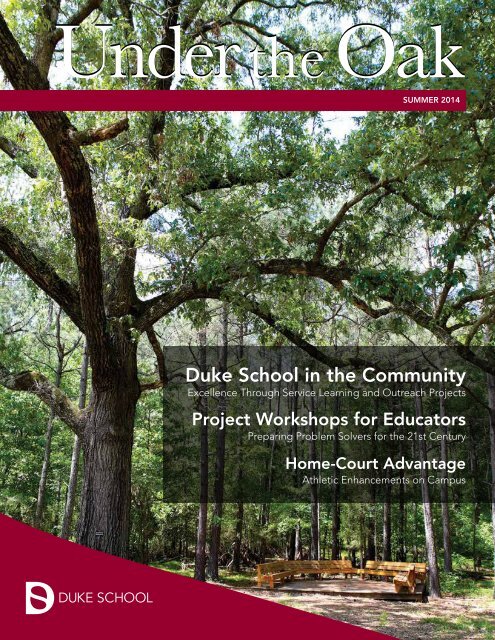

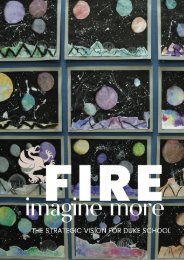
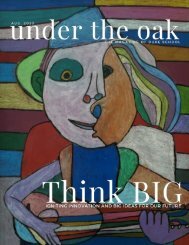
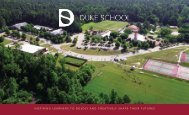

![Under the Oak 2023 [FINAL5] (1)](https://img.yumpu.com/68405392/1/190x245/under-the-oak-2023-final5-1.jpg?quality=85)

